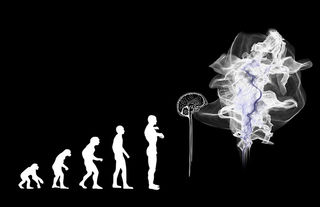Artificial Intelligence
How AI and Quantum Computing May Alter Humanity’s Future
Physics, AI, and the future
Posted January 18, 2019

Quantum computing is a relatively modern technology that pioneering scientists, researchers, and entrepreneurs worldwide are actively seeking to commercialize. For example, recently at CES (Consumer Electronics Show) in January 2019, IBM debuted its “Q System One” as the first standalone quantum computer geared for scientific and commercial use. Making quantum computing accessible will help accelerate progress in artificial intelligence (AI). Speed up computing, and you enhance the performance of deep learning.
For example, the parallel processing capabilities of GPUs (graphics processing units) helped accelerate AI deep learning by providing greater computational power than serial processing CPUs (central processing units) to process large amounts of big data used for machine learning. Quantum computing may greatly accelerate AI deep learning by enabling greater computational speed and power. But is quantum computing actually more powerful than classical computing?
Common sense would answer that question affirmatively. However it was not until October 2018 that this was proven in theory in a paper published in Science by AI researchers Robert König, Sergey Bravyi, and David Gosset.
Quantum computing refers to computers based on quantum mechanics, a branch of physics that focuses on nature at the microscopic level. Classical physics, in contrast to quantum physics, is the study of the nature at the macroscopic level and includes the theories of Newton’s laws of motion.
In traditional computers, data can be encoded into binary digits (bits) and have a value or state of either a “0” or “1.” In quantum computing, data is encoded in quantum bits (qubits) which can have values of “0”, “1,” or any quantum superposition of the two qubit states.
König and the AI research team showed that quantum outperforms classical computing and that quantum effects can “enhance information-processing capabilities and speed up the solution of certain computational problems.” In their research, the team demonstrated that parallel quantum algorithms running in a constant time outperform classical computers. The scientists showed that quantum computers only required a fixed number of steps for problem solving and was better at “solving certain linear algebra problems associated with binary quadratic forms.”
Forward-thinking organizations recognize the synergistic boost that the combination of quantum computing and artificial intelligence may herald. Microsoft CEO Satya Nadella stated in a WSJ Magazine interview, “What’s the next breakthrough that will allow us to keep up this exponential growth in computing power and to solve problems—whether it’s about climate or food production or drug discovery? I think that’s where quantum plays a role." Per Nadella, artificial intelligence and quantum computing are "going to shape a lot of the technology going forward.”
Copyright © 2019 Cami Rosso All rights reserved.
References
IBM (2019, January 8).“IBM Unveils World's First Integrated Quantum Computing System for Commercial Use.” Retrieved from https://newsroom.ibm.com/2019-01-08-IBM-Unveils-Worlds-First-Integrated…
Stevenson, Seth. “A Rare Joint Interview with Microsoft CEO Satya Nadella and Bill Gates.” WSJ Magazine. September 25, 2017.


